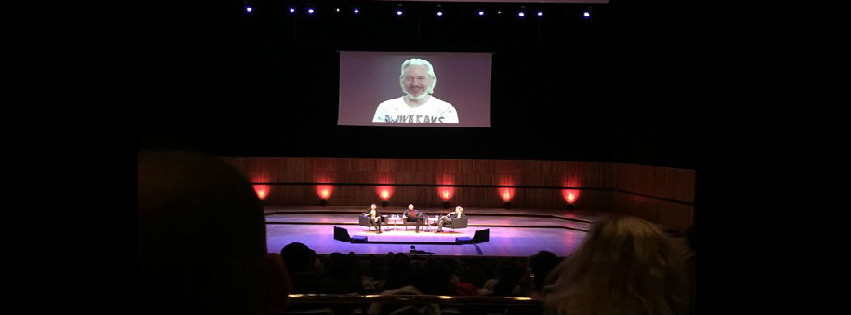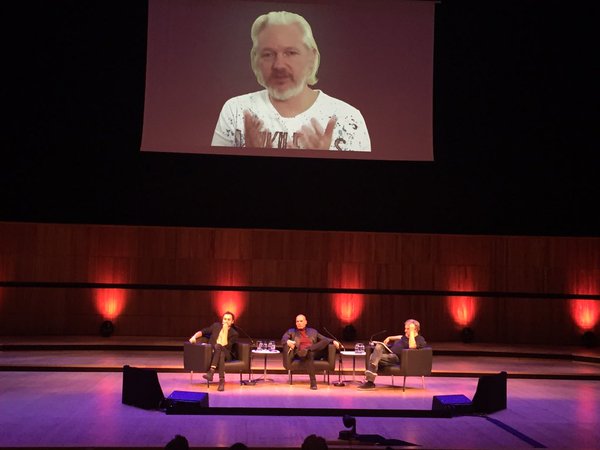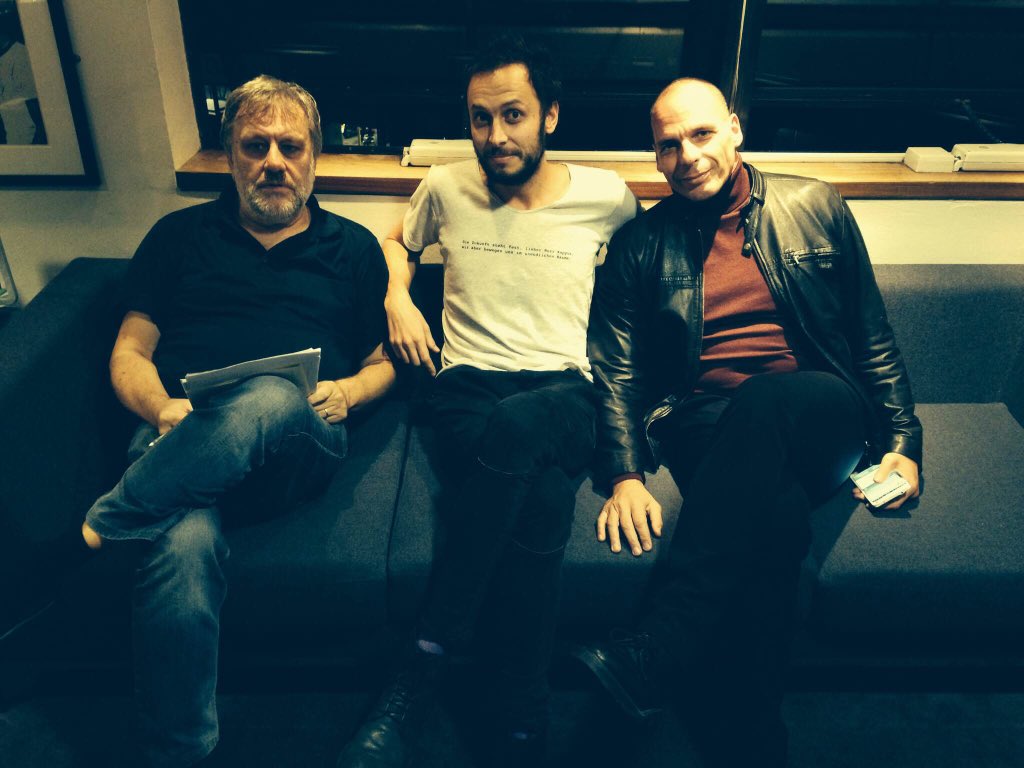Slavoj Žižek, Yanis Varoufakis & Julian Assange @ The 'Europe
Is Kaput!' Event In London -- What Was Said
27/11/2015

On Monday 16th November 2015, Yanis Varoufakis, Slavoj Žižek and Srećko Horvat (mediator) walked onto the stage at The Southbank Centre in London for a discussion entitled: 'Europe is Kaput!'. Thirty minutes in and they announced a surprise guest speaker whom would be streamed in through live video feed for the rest of the debate - Julian Assange. What is detailed below is the topics which were discussed and individual comments in response. Largely there was consensus between the speakers, with Slavoj acting as devils advocate. As the discussion lasted three hours this is a summary of those points which were most clear, concise and of interest, for those who may wish to read them.
It should be noted that given the nature of such discussions, and the speakers (i.e. Žižek), there was some discontinuity in topic discussion throughout the evening. Therefore, comments are not listed chronologically but thematically for ease of reading.
The closing remark of the evening came from Slavoj and seemed fitting to separate, here:
"You end capitalism, you end ISIS"
(emphasising their interconnectedness as opposed to a method)
Opening:
Paris, ISIS, Europe and the refugee crisis
Paris, ISIS, Europe and the refugee crisis
Žižek: What is clear is that those who will be the biggest victims of the Paris attacks are those already involved in the humanitarian crisis - refugees.
Particularly those already fleeing
ISIS in Syria, only to be victims of the groups actions a second time. But what
should not be ignored is that there is incredible levels of violence in the
world at present, with many people losing their lives on the same day as those
in Paris, which go unnoticed and un-noted in Western media.
Further, this
rhetoric of 'solidarity' with the Parisians, and that these attacks are on 'all
of us' does not appear to extend out further than the West - such attacks have
been the reality of the people of Syria, daily, for five years. On global
violence: in Africa a woman is raped every four minutes and a woman killed by
her sexual partner every eight hours. He argued that such violence, including
that of Paris, appears as though it occurs in another reality - through a TV
screen.
He criticised the: "But refugees are just like us" rhetoric
by the left and others, because what are the implication(s) if we find they're
not just like us? Does that then mean they should drown?
There should be another basis for helping, and it should not need justification
such as this.
On the 'symbolism' of nation states using the French flag on
buildings, bridges: where is the flag for those lost in Baghdad, Africa,
Belarus, etc., each day?
Varoufakis: We should respond in such a way as to take a minutes silence, and light up our buildings, but it should include responses and respect for the violence in other parts of the world so we cannot ignore it, so we must internalise it, and it is in our consciousness.
Žižek: We must realize, and stop speaking as though, there is a cultural divide, but recognize that Paris, ISIS, the Holocaust, Palestine, etc. is all part of the same struggle. We must also recognize that exposure to suffering does not make you more sensitive to it (spoke of Holocaust victims taking part in Palestine) and therefore needs reactions from us all and not just those involved.
Varoufakis: Borders are always justified and legitimised for the same reason: in the interest of security, yet they breed the exact opposite. Borders only increase tension, the profits to be made from smuggling, and cast a constant denial onto those who are divided from each other.
The problem with the European Union is that it is
failing to behave at the level of European Union, at its zero level.
There
is no such thing as European Foreign Policy and the Union is so fragmented that
it cannot act effectively/at all. The Union suffers from a 'democratic
deficit'. It is analytically fallacious to speak of 'The Greeks' or 'The
Germans' as opinions are so varied. Identity and nationalism are completely
different. Therefore, the language of EU leaders, representatives and civilians
of 'Germans, Greeks' etc. is unhelpful and adds to fragmentation.
Žižek: Of course we should intervene, we created the situation. But there is a dark side to this 'economic neocolonialism' rhetoric. Not only are ISIS tied into profits from oil, which has global economic interests (China, USA etc.) but aspects of our culture such as 'feminism', completely exclude e.g. Muslim feminists, and other cultures' inputs.
Adding to this, we also refer to other conflicts as 'ethnic
issues', stating "'Well, of course we're involved, it's our fault".
This arrogance presumes cultures and nation states cannot configure their own
atrocities and act as autonomous agents. He referred to African friends
who had remarked (paraphrase), 'At least let us think for ourselves'. Along the
lines of this overbearing occupation from the West - Iraq was once home to many
Christians who had senior positions in governments, and there was tolerance.
Following the war they have all but left the country. There were also many
females occupying senior government positions. It is a question of: how,
when, and to what extent should we intervene?
Žižek, cont.: We must also remember that Saudi Arabia is one of the most corrupt countries, involved directly, intrinsically and fundamentally immersed in global financial markets as one of the richest states - with around a 10% ownership of US bonds, etc. - and whilst Conservatives touch on this issue it is not dealt with: that Saudi Arabia, the Emirates, Qatar, are doing nothing.
The European Union
Varoufakis: Issues surrounding the European Union include:
1) A lack of transparency - having sat in on meetings he is positive their behaviour would alter if such meetings were televised. Citizens have a right to understand what decisions are being made on their part, and leaders know this. This would not require law or policy changes, simply the opening of doors. Let them tell us why this is not possible. There is no easier way to democratise.
2) It is part of the design of Europe to be dysfunctional, an intrinsic quality. This must be addressed. For example: The European Central Bank's policies lead to, for him, an inevitable crisis.
3) Nation states are brought into being through the need for conflict resolution e.g. Magna Carta - conflict between merchants and the King, Capitalism - vested interests of companies and the labour force. The role of the nation state is to be a steward, to regulate. It became more important to societies because of this evolutionary, developed, capability and its efficiency at performing such a role. The EU is different to this, as a cartel for industry and trade. The head of the cartel is in Brussels but it is not a government and therefore does fulfil such a purpose. It is administrative. Therefore tension between what we wish it to be, it professes to be, and it can function to be, exists. This also needs to be addressed if it is to function, and not completely destabilise and collapse leading to a 1930s style of living.
4) You cannot 'exit' Europe, and discussions need to recognize this. It is like the lyrics from The Eagle's 'Hotel California': You can check out, but you can never leave. Ultimately, as a farmer in France you will be governed by their price stability mechanisms, their agricultural reforms and standards enforcement.
5) The dissatisfaction with the Union due to its destabilising effects could be countered with such measured as: cheques for food given out to citizens by the EU, which are not real money but exchange for food so that families do not go hungry. This is akin to the US's 'food stamps' situation whereby the level of those who live below the poverty line would increase to 26% of its citizens from 14-15% without them. It would encourage unity and satisfaction amongst those who live within it.
6) Brussels is not a government and should behave as a constitutional assembly. There should also be a body of elected citizens whom oversee and shadow activities who take the interests of the public to Brussels in how they wish it to operate and behave.e
7) The UK should be a part of these reforms as opposed to retreating into the figment of their imaginary global economy which exists without the EU - it doesn't, it won't and David Cameron must be a part of discussions.
8) The problem of the EU's fragmentation if the choice is to either retreat back to the level of the nation state or democratise and continue in this direction, this is fundamentally inconsistent with the technological advances that have been made over the last twenty years e.g. the Internet and social media. There is greater connectivity between people across borders.
Žižek: Even if you held televised meetings they would have secret meetings the next day
Varoufakis: Yes, but you will always struggle to control the powers that be, but you must still take steps

Žižek made a joke, at the end of the
evening, stating we should leave Julian now so he can go and take a nice stroll
around his... room. He says he makes this tasteless joke to highlight that we
should not forget about him.
Enter, Julian
Wikileaks, Syria, ISIS, the US, capitalism, global geo-politics,
technology and Silicon Valley's unchallenged ideological assault
Assange: Wikileaks has discovered documents going as far back as 2006 which detail the US's plans to overthrow the Syrian government, to increase 'paranoia' and 'frighten' (words used in documents), cause the Assad regime to overreact, and to prevent foreign investment and cooperation.
In 2010 Syria requested assistance to stop
terrorists entering from Iraq. Assange stated that Libya was 'Hillary's
war', and that Generals had written in documents that she pushed 'over and
above' what was necessary.
He then displayed footage of the moment Hilary
Clinton was told of Gaddafi's sodomy and subsequent murder. The video showered
her throwing her head back laughing, cackling, with a large satisfied grin. The
reporter who she was with during an interview repeatedly asked, "Was that
to do with your visit recently?" which prompted further laughter.
Assange, cont: There is a spiritual dimension to this issue that we have to consider - there is something in Hilary, and in her reaction, that personality, that has an 85% chance of entering, and embedding itself in, the White House after the election. That is something to think about: how a Western head of state reacts to another head of state being other thrown and killed in such a manner, and that person becoming the most powerful individual on earth.
- Rather than look for stability, France has also roused community fear by requesting everyone run to their local hospital to donate blood; there is talk of 'borders', 'crackdowns' and the British have already highlighted surveillance. This plays directly into ISIS's crackdown of the 'grey zone' between devout muslims and those Muslims embedded in Western ways, with increased Islamophobia and disunification in multicultural states.
- There is no ideological alternative being proposed: Isis vs. the West. What can occupy the middle ground? There needs to be a new European left movement. A type of 'Christianity', a preaching of love and unification.
Varoufakis: The paradox of the last 20 years has been that we have increased our communication, its frequency, participants and methods to do so. And there was the opportunity to produce a clear picture of the world. But instead, the content of that information, and what we actually know, is decreasing. It is dynamite to the foundation of the EU and adds to its 'democratic deficit'. Wikileaks is a bridge. It is, what Julian called, 'Scientific Journalism'. It provides information that does not rely on secondary and tertiary information, or is sources from those with vested, corporate, interests. It is the antithesis of the growing 4th hand knowledge in which people return to the source of those who misinformed them in the first place. Its triumph is that it is using that very same technology (e-mail, etc.) which allows for covert communication to disrupt this process.
Varoufakis: It is not that capitalism is flawed because it breeds inequality, it is flawed because it is extremely wasteful between human and material resources and their capacities. Issues such as rising inequality are by-products to this wastefulness that underpins it. It will also other throw itself through the technologies it creates. Apple, for instance, are bringing back their first stores to the US from China, not because they will fill them with American employees but because they will be the first to be robotised.
Assange: When you speak to senior figures in Silicon Valley such as Google's Chairman they have frightening worldviews. There is a real 'poverty' there, in that respect. There is a 'High-tech liberalism' ideology, which you can see references to in Google's book mentioning a 'new digital age', with Washington already going to Silicon Valley for information and solutions. They, as corporations have great experience in managing sheer scale, and with competency. They even have influence in some local governments. When you go to India and China and ask young people about their futures they say they want to work for Facebook, or if they're radical, start their own Facebook. Beyond this, Silicon Valley also 'rebrands' when it's abroad. For instance, to be "Doing it the Chinese/Indian way", but there's no choice, there's no 'China/India' involved - it's just a rebranding of Silicon Valley's ideology. And there's no growing competition.
The Transatlantic Trade and Investment Partnership (TTIP) agreement:
Q: To Assange following revelation of Wikileaks documents concerning TTIP: How dangerous is it?
Assange: It's
the biggest venture for global, economic and legal unity outside of the EU. It
incorporates countries which when summed are responsible for the handling of
two-thirds of the worlds GDP, encompasses 1.6 billion people and excludes
chiefly non-Western countries (Russia, South Africa, China etc. - Author
note: Whom have their own arrangements, for instance, the BRICS Central
Bank consisting of: Brazil, Russia, India, China and South Africa).
They
will have monopoly power over, for instance, the pricing of goods (Author note: as the EU has price stability
mechanisms. As is the role of all Central Banks to use monetary policy to
achieve price stability and inflation targets]) and the regulation
of the largest pharmaceutical companies in the world.
Hilary Clinton has
referred to it as an "economic NATO". Assange spoke of this alignment
to be purposefully pulling apart some of the unity already made in continental
Europe with the European Union (in industry and trade terms) as to,
economically, seek incorporation in case there would be further ties made to
Asia, leaving the US behind.
Varoufakis: It
is not about free-trade, it is about specifying who has the right to an idea.
Who has the capacity to tell a certain company, "You can charge this
amount". These are the people making daily decisions about our future
without us knowing about it: what pesticides can be used, what genome will be
disregarded in a plant species, etc.
Politics, knowledge, nation state borders,
the Internet/social media and 'left' and 'right' wing
Assange: What
we thought would happen with the advent of a global source of information (i.e.
the Internet) also created the opposite: intellectual, global, homogenization
of ideas also became "the Scottish becoming more Scottish", and
"the Right becoming more Right". Those who wanted to connect came to
connect even more. So we've also seen the deepening of divides, and
identification with distinctions between us, as we have the increase of
homogeneity.
Žižek: But
why didn't the Left become more Left?
Varoufakis: Bernie
Sander's success existing in the USA is not futile. 10% of the vote is a
success.
Žižek: Yes,
he found contact with people whom typically it would be impossible to reach. It
is not that the Left should try to 'overthrow' but rather strategically point
towards, and have, debates which need to be had. In every situation, such as
Paris, isolate one modest point and begin from there.
Q
from audience member: Doesn't democratising the EU create
a greater sense of difference and separation from the world?
Varoufakis: Yes,
we must think larger, global. I do not think in terms of borders. We're not
limited to the size of the EU.







No comments:
Post a Comment